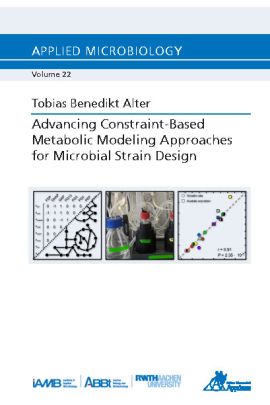The challenge of establishing economically feasible bioprocesses for the production of biofuels, plastic precursors, or fine chemicals is strongly coupled to the development of highly productive microbial cell factories. This thesis aims to contribute by improving the predictability, reliability, and applicability of favorable genetic intervention strategies for microbial metabolite overproduction on a simulation-, optimization-, and application-level.
On the application-level, a stand-alone, custom-made mini-bioreactor system was reconfigured to foster the accessibility and parallelization of adaptive laboratory evolution experiments as a strain design technique. The practical work was complemented by theoretical considerations of the metabolic coupling between microbial growth and the production of desired chemicals.
To improve the predictability of microbial mutant phenotypes on the simulation-level, metabolic models were extended with mass balances for the total protein household of a cell. The resulting protein allocation model superiorly simulates microbial wild-type behavior for a range of environmental conditions. By accounting for intrinsic limitations in the transcription of genes, this concept was expanded to give meaningful phenotype predictions for genetically engineered microbes.
To consolidate the in silico strain design process, a genetic optimization algorithm for strain design purposes was implemented. Novel features were integrated and the framework's capability to simultaneously handle multiple, complex objective engineering functions for the search of gene knockouts and heterologous reaction insertions was shown.
While this work advances the use of metabolic models for designing industrially relevant microbial cell factories, at the same time, the presented theoretical results give valuable insights into the functioning and limitations of microbial metabolism. Thus, this thesis is also meant to widely promote the application of model-based approaches in the biological sciences to make the most out of the available data for engineering and knowledge generation purposes.
| Autor | Alter, Tobias |
|---|---|
| Lieferzeit | 3-4 Tage |
| Gewicht | 0.317 kg |
| Erscheinungsdatum | 16.09.2020 |
Dissertationen
Advancing Constraint-Based Metabolic Modeling Approaches for Microbial Strain Design
Kurzbeschreibung
This dissertation advances the use of metabolic models for designing industrially relevant microbial cell factories. At the same time, the presented theoretical results give valuable insights into the functioning and limitations of microbial metabolism. Thus, the application of model-based approaches in the biological sciences to make the most out of the available data for engineering and knowledge generation purposes is widely promoted.

